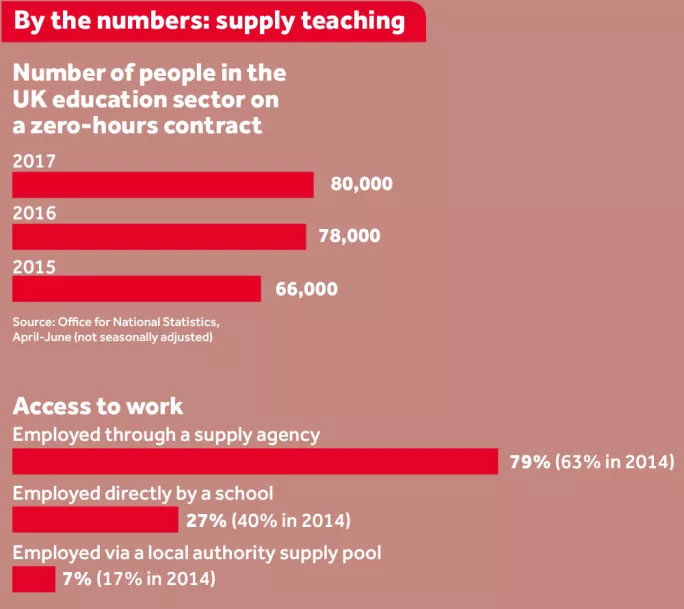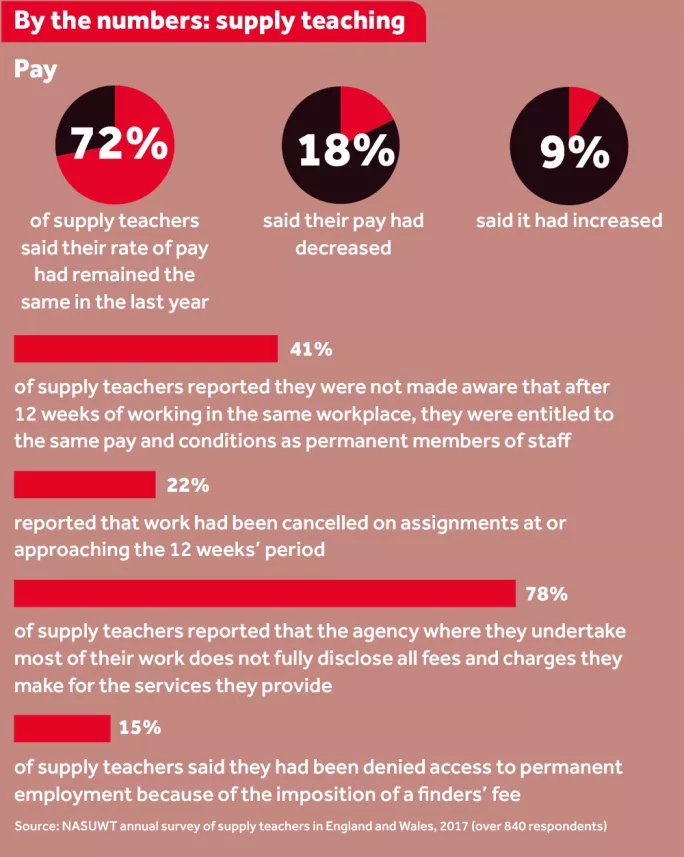‘Exploitative practices’: has supply teaching reached an all-time low?

Schools in the grip of a recruitment crisis are facing spiralling agency costs. But many supply teachers say their work has never been less secure or worse paid, despite the unprecedented demand for their services.
A Tes investigation has uncovered a wide range of practices that union leaders, headteachers and teachers say are suppressing wages and at the same time inflicting even higher costs on cash-strapped schools.
These include unpaid “trial days”, moving staff into different roles before their employment rights kick in and moving the best teachers around schools like “chess pieces”.
Tes has also seen evidence of an agency warning workers not to discuss salaries with peers, and has spoken to teachers who say finders’ fees have cost them longer-term positions.
At the same time, figures analysed by Tes reveal a sharp rise in the number of people in the education sector - many of whom are believed to be agency workers - employed on zero-hours contracts.
Prominent education figures are warning that the government needs to step in to halt “exploitative” practices by agencies.
Chris Keates, the NASUWT teaching union general secretary, says: “We think the picture is getting worse in many respects and we see a complete and utter reluctance of government to intervene. If that’s the case then this is only going to continue and it might get worse.”
How did we end up here? While schools are struggling to fill roles, supply teachers are pointing to a sharp decline in the work available this year. This, they say, is because agencies take on far more teachers than there are jobs and put barriers in place that prevent them from taking longer-term positions.
A primary supply teacher in Yorkshire says this term she has only had eight days of work, four of which have been in the last two weeks. “It’s been really bad since September,” she says.
Many of those who have found work say they are being hit with falling pay, or not being paid what they are legally due.
Under Agency Worker Regulations (AWR), after working in a role for 12 weeks at the same school they should be paid as if they are in that role permanently.

Many supply teachers we have spoken to say this has not been the case. Those who have mentioned AWR rules to their agency have been threatened with a lack of future work.
One supply teacher in the Midlands says that, when she asked for pay parity, she was told “to think about it” and that there “might not be much work in future”.
“I later found out that a school had requested me for work and the agency had told them I was unavailable,” she adds. “When I queried this, the agency stopped contacting me.”
It is illegal for an agency not to give the teacher pay parity, explains Heather Mitchell, an employment lawyer at Browne Jackson.
“The agency worker is likely to be able to bring a claim for detriment under the AWRs. This would include compensation payable to the worker taking into account financial loss suffered.”
However, in a NASUWT survey of supply teachers this year, more than a fifth said that work had been cancelled on assignments at or approaching the 12-week period.
Sometimes, schools are finding that a teacher who they are very happy with is moved to a different school “like a piece on a chessboard” so that the agency can “maximise its exposure”, according to Keates.
“There’s a real lack of transparency, a lack of access to rights for supply teachers, they don’t really know that they’re being exploited. And, by the same token, some schools don’t know how the supply teacher is being exploited or treated, because they want a body in a room.”
Andrew Morris, the NEU teaching union’s assistant general secretary, is also seeing more supply workers being asked to undertake unpaid work as part of “trial days”, or asked to teach classes while employed in lower-paid roles.
He says: “Increasingly, a number of teachers are expected to work for free, or being asked to teach when they are being employed as cover supervisors.”

Tom Hadley, director of policy and professional services at the REC, an agency trade body, says supply teachers’ pay rates are set by the schools, not the agencies. And, although agencies typically charge between 15 and 30 per cent as a fee for their services, he points out that this includes advertising for the vacancy, finding the teacher, safeguarding and background checks, National Insurance payroll, liability insurance and holiday pay for the supply teacher.
There is no doubt that agency costs are rising: Schools in England spent £1.3 billion on supply teachers in 2015-16, according to government figures published last month - a 4 per cent increase on the previous year.
In response to these growing pressures, the Department for Education is planning to create a pool of trusted supply agencies - but there are doubts over to what extent this will help schools.
Michael Ferry, headteacher of St Wilfred’s Secondary School in Crawley, West Sussex, believes the reason supply prices have risen is because agencies know the difficulties that schools are facing to recruit teachers.
“Agencies know we all have Ofsted, DfE, the local authority, looking over our shoulders at a time where the accountability of schools and headteachers has never been higher, so we’re desperate to ensure that we have specialist staff in place in key areas,” he says.
Ferry was recently quoted £277 per day for a science teacher - £100 more than it would have cost him a couple of years ago.
“I’ve never known teacher recruitment to be so hard,” he adds.

Mary Bousted, joint general secretary at NEU, describes the current situation as “almost like a form of extortion” as “the supply agencies hold all the cards”.
It’s a situation of “pay us the money or else you’re not going to get a teacher,” she adds.
But Nick Bowles, head of stakeholder engagement at APSCo, which represents supply agencies, warns against forming “broad brush opinions” on the basis of “a few bad apples”.
He says: “The cost of compliance - in terms of the checks needed and the staff required to undergo those checks and keep up to date with legal requirements is high.” Sourcing the right skills can often mean overseas trips to run careers fairs to attract qualified teachers to work in the UK, he says, which “is a cost to the agency - not the school”.
A DfE spokesperson says: “Teachers play a hugely important role in our society, and there are now more teachers in our schools than ever before - 15,500 more since 2010.
“All agencies providing supply teachers must comply with legislation on their pay and conditions. Any found not to be doing so can be investigated by the Employment Agency Standards Inspectorate.”
The parent company of Tes magazine owns three teacher supply agencies
You need a Tes subscription to read this article
Subscribe now to read this article and get other subscriber-only content:
- Unlimited access to all Tes magazine content
- Exclusive subscriber-only stories
- Award-winning email newsletters
Already a subscriber? Log in
You need a subscription to read this article
Subscribe now to read this article and get other subscriber-only content, including:
- Unlimited access to all Tes magazine content
- Exclusive subscriber-only stories
- Award-winning email newsletters